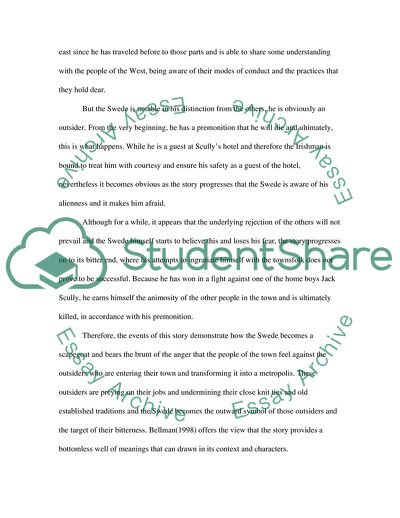
- Home
- Free Samples
- Premium Essays
- Editing Services
- Extra Tools
- Essay Writing Help
- About Us
- Studentshare
- Subjects
- Miscellaneous
- Topic Proposal
Topic Proposal - Essay Example

- Subject: Miscellaneous
- Type: Essay
- Level: Undergraduate
- Pages: 4 (1000 words)
- Downloads: 0
- Author: zaria91
Extract of sample "Topic Proposal"
er, whose authority has been accepted unquestioningly for generations, they are unable to seek retribution and fear for their lives or their welfare if they do so, because this would upset the status quo and place their own livelihoods in jeopardy. Nevertheless, there is frustration and bitterness that builds up among the common folk due to the injustices they are suffering and they need an outlet to vent those frustrations so that violence and chaos do not erupt within the framework of society.
Thus, there appears to be an unspoken message that unites all the people, so that they select someone who can become the scapegoat that will be made the sacrificial lamb – to bear the wrath of the public and the punishment for the sins of others (Kosenko, 1985). This message runs through both the stories. For example, in the story of “The Blue Hotel”, the Swede is an outsider who has come from the east and is not used to the ways of the West. Although there is another man from the East who also visits the little town where the Blue Hotel is located, he is not so noticeably scared when he visits the east since he has traveled before to those parts and is able to share some understanding with the people of the West, being aware of their modes of conduct and the practices that they hold dear.
But the Swede is notable in his distinction from the others, he is obviously an outsider. From the very beginning, he has a premonition that he will die and ultimately, this is what happens. While he is a guest at Scully’s hotel and therefore the Irishman is bound to treat him with courtesy and ensure his safety as a guest of the hotel, nevertheless it becomes obvious as the story progresses that the Swede is aware of his alienness and it makes him afraid. Although for a while, it appears that the underlying rejection of the others will not prevail and the Swede himself starts to believe this and loses his fear, the story progresses on to its bitter end, where his attempts to
...Download file to see next pages Read MoreCHECK THESE SAMPLES OF Topic Proposal
Medieval Spanish Literature. Topic Proposal. Annotated Biblio
Tate Modern topic proposal 200-300 words
UK Home Shopping
Topic Proposal: Should Military be manditory after high school in the US
Analysis and argument
Topic Proposal on Should Testimonies of Lay Witnesses be Allowed in Court
Students Ability to Learn English Grammar
East Asian Politics

- TERMS & CONDITIONS
- PRIVACY POLICY
- COOKIES POLICY